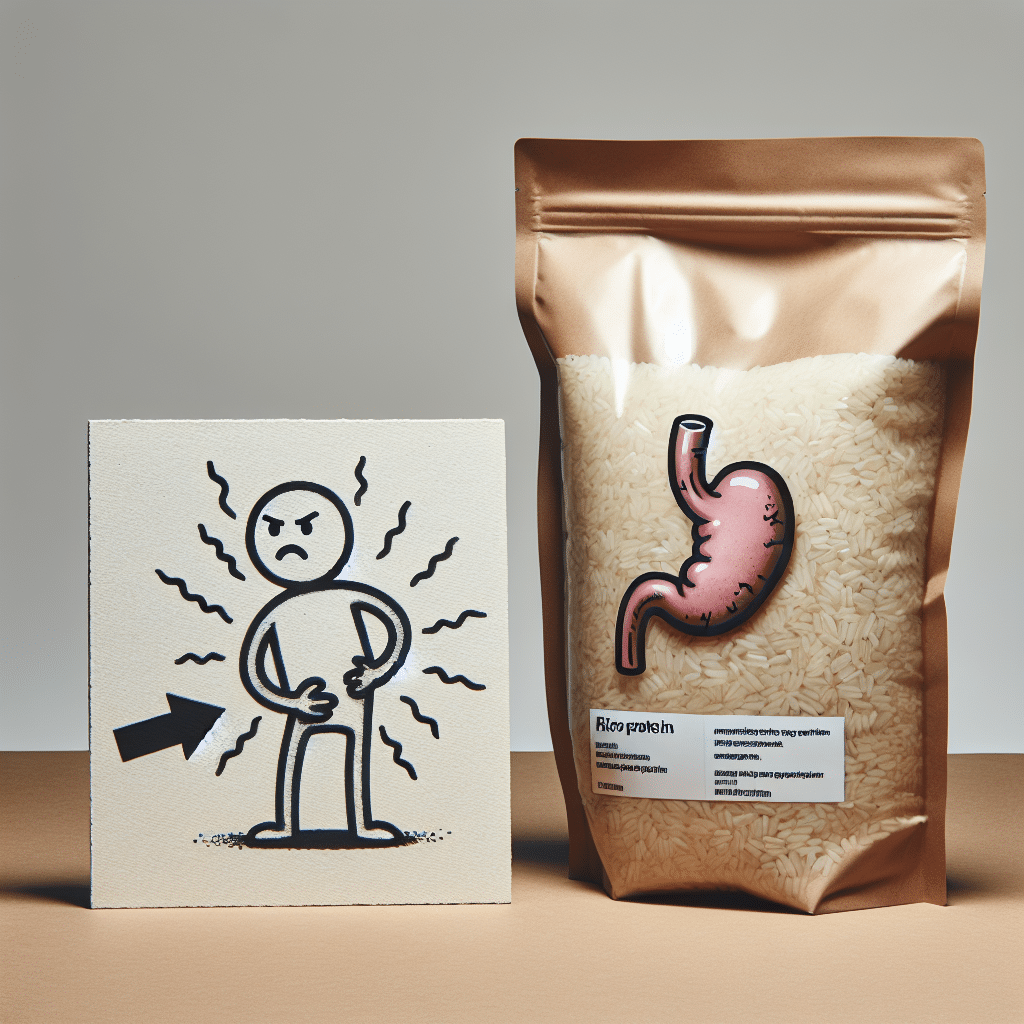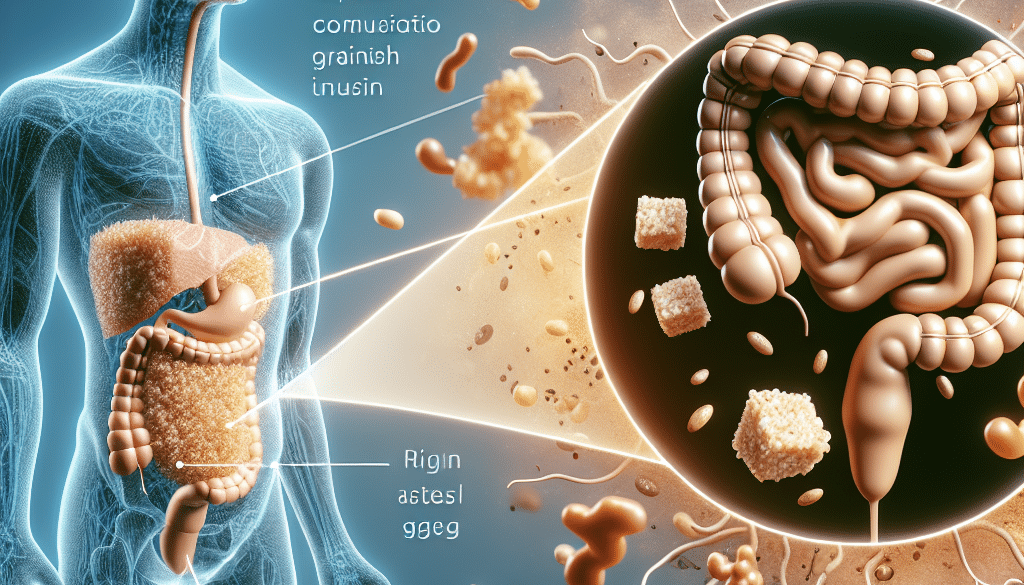Can Rice Protein Cause Bloating?
-
Table of Contents
- Rice Protein and Bloating: Understanding the Connection
- What is Rice Protein?
- Can Rice Protein Cause Bloating?
- Digestibility of Rice Protein
- FODMAP Content
- Portion Sizes and Consumption Habits
- Additives and Sweeteners
- How to Reduce Bloating When Consuming Rice Protein
- Case Studies and Research
- Statistics on Protein Supplement Usage and Digestive Issues
- Conclusion: Balancing Protein Intake and Digestive Comfort
- Discover ETprotein’s High-Quality Protein Products
Rice Protein and Bloating: Understanding the Connection

Protein supplements have become a staple in the diets of health enthusiasts, athletes, and those looking to manage their weight or dietary restrictions. Among the various types of protein powders available, rice protein has gained popularity, especially among vegans and individuals with allergies to dairy or soy. However, some users report experiencing bloating after consuming rice protein. This article delves into whether rice protein can cause bloating, the factors contributing to this condition, and how to mitigate its effects.
What is Rice Protein?
Rice protein is a plant-based protein derived from brown rice. It is often treated with enzymes that separate the carbohydrates from the proteins, resulting in a protein-rich powder. Rice protein is considered hypoallergenic and is a suitable alternative for those with lactose intolerance, gluten sensitivity, or soy allergies. It is also favored for its ease of digestion and absorption.
Can Rice Protein Cause Bloating?
Bloating is a common digestive issue characterized by a feeling of fullness or swelling in the abdominal area. It can be caused by various factors, including dietary choices. To understand if rice protein can cause bloating, it’s essential to consider the following aspects:
Digestibility of Rice Protein
Rice protein is generally recognized for its digestibility. However, individual tolerance can vary. Some people may experience difficulty digesting protein powders, leading to bloating and gas. The presence of fiber in brown rice protein can also contribute to bloating in sensitive individuals.
FODMAP Content
FODMAPs (Fermentable Oligo-, Di-, Mono-saccharides And Polyols) are short-chain carbohydrates that can ferment in the gut, causing bloating and discomfort in some people, particularly those with Irritable Bowel Syndrome (IBS). While rice protein is considered low in FODMAPs, the additional ingredients in some protein powders may be high in these fermentable sugars.
Portion Sizes and Consumption Habits
Consuming large amounts of protein in a single sitting can overwhelm the digestive system, leading to bloating. Additionally, how one consumes rice protein—whether quickly or without sufficient water—can also contribute to bloating.
Additives and Sweeteners
Many protein powders contain additives, artificial sweeteners, or sugar alcohols that can cause bloating and gastrointestinal distress in some individuals.
How to Reduce Bloating When Consuming Rice Protein
To minimize the risk of bloating when incorporating rice protein into your diet, consider the following tips:
- Start with Small Servings: Gradually increase your intake of rice protein to allow your digestive system to adjust.
- Stay Hydrated: Drink plenty of water throughout the day to help facilitate digestion and absorption.
- Check for Additives: Choose rice protein powders with minimal additives and sweeteners.
- Blend with Digestive Aids: Combine rice protein with digestive enzymes or probiotics to enhance gut health.
- Monitor Your Diet: Keep track of other foods in your diet that may contribute to bloating and adjust accordingly.
Case Studies and Research
While there is limited research specifically on rice protein and bloating, studies on plant-based proteins and digestive health can provide insights. For instance, a study published in the Nutrition Journal found that participants consuming plant-based protein shakes reported similar levels of gastrointestinal comfort compared to those consuming whey protein shakes. However, individual experiences can vary, and more research is needed to fully understand the relationship between rice protein and bloating.
Statistics on Protein Supplement Usage and Digestive Issues
According to market research, the global protein supplement market is growing, with plant-based proteins gaining significant traction. Despite the benefits, digestive issues such as bloating are commonly reported side effects of protein supplement usage. A survey by the International Food Information Council Foundation revealed that among consumers who have experienced adverse effects from food, nearly 20% reported bloating as a symptom.
Conclusion: Balancing Protein Intake and Digestive Comfort
In conclusion, while rice protein is a valuable source of plant-based protein with many benefits, it can cause bloating in some individuals. Factors such as digestibility, FODMAP content, portion sizes, and additives play a role in this condition. By following the tips provided and choosing high-quality protein powders, one can enjoy the benefits of rice protein without discomfort. It’s essential to listen to your body and consult with a healthcare professional if you experience persistent bloating.
Discover ETprotein’s High-Quality Protein Products
If you’re looking for premium rice protein powders that minimize the risk of bloating, consider ETprotein’s offerings. Their organic rice protein is characterized by a neutral taste, non-GMO, and allergen-free attributes, making it an excellent choice for those with dietary sensitivities. With a commitment to quality and customer satisfaction, ETprotein ensures that their products cater to your health and wellness needs.
About ETprotein:
ETprotein, a reputable protein and L-(+)-Ergothioneine (EGT) Chinese factory manufacturer and supplier, is renowned for producing, stocking, exporting, and delivering the highest quality organic bulk vegan proteins and L-(+)-Ergothioneine. They include Organic rice protein, clear rice protein, pea protein, clear pea protein, watermelon seed protein, pumpkin seed protein, sunflower seed protein, mung bean protein, peanut protein, and L-(+)-Ergothioneine EGT Pharmaceutical grade, L-(+)-Ergothioneine EGT food grade, L-(+)-Ergothioneine EGT cosmetic grade, L-(+)-Ergothioneine EGT reference grade and L-(+)-Ergothioneine EGT standard. Their offerings, characterized by a neutral taste, non-GMO, allergen-free attributes, with L-(+)-Ergothioneine purity over 98%, 99%, cater to a diverse range of industries. They serve nutraceutical, pharmaceutical, cosmeceutical, veterinary, as well as food and beverage finished product distributors, traders, and manufacturers across Europe, USA, Canada, Australia, Thailand, Japan, Korea, Brazil, and Chile, among others.
ETprotein specialization includes exporting and delivering tailor-made protein powder and finished nutritional supplements. Their extensive product range covers sectors like Food and Beverage, Sports Nutrition, Weight Management, Dietary Supplements, Health and Wellness Products, and Infant Formula, ensuring comprehensive solutions to meet all your protein needs.
As a trusted company by leading global food and beverage brands and Fortune 500 companies, ETprotein reinforces China’s reputation in the global arena. For more information or to sample their products, please contact them and email sales(at)ETprotein.com today.












